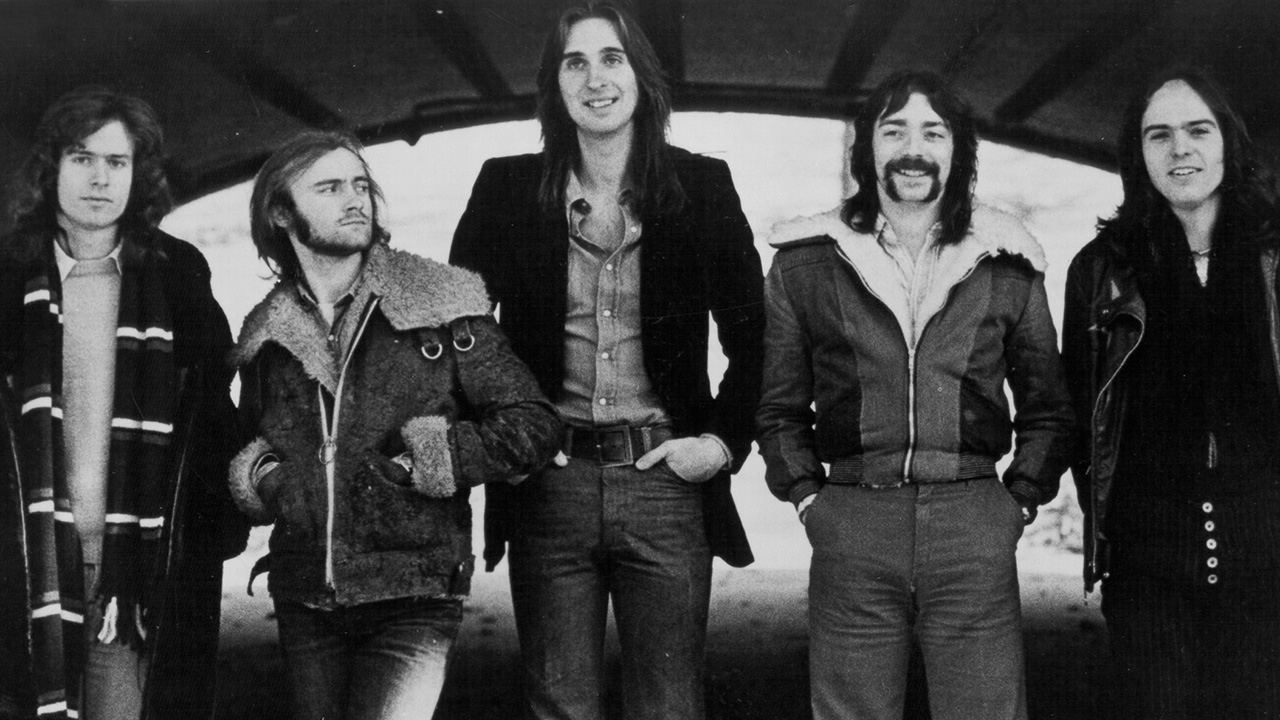In 2019 Prog readers were invited to list their favourite Genesis songs. It was our biggest-ever poll at the time, with tens of thousands of people having their say. Here's the resulting top 10.
10. Dance On A Volcano
From A Trick Of The Tail, 1976
Proving that the band could survive and thrive without the recently-departed Peter Gabriel, Dance On A Volcano was born out a jam between Tony Banks, Mike Rutherford and Phil Collins at the outset of the writing sessions for the album, while Steve Hackett was still busy finishing his solo record, Voyage Of The Acolyte. “It set us off in a really good direction,” says Banks.
9. Ripples...
From A Trick Of The Tail, 1976
As Phil Collins steps up to the mic as lead singer for the first time, the music begins to evolve to suit the new four-piece format. The composition also seemed to successfully straddle Genesis’ past and future approaches to songwriting.
8. In The Cage
From The Lamb Lies Down On Broadway, 1974
In The Cage captures the mounting panic of the album’s protagonist, Rael, trapped in a prison formed of stalactites and stalagmites. Underpinned by the heartbeat of Banks’ pulsing keyboards, the musical intensity builds alongside Rael’s growing claustrophobia. It’s tempting to read In The Cage as Gabriel longing for the creative freedom he would eventually embrace as a solo artist.
7. Watcher Of The Skies
From Foxtrot, 1972
Banks’ swirling Mellotron providing the entrance music for Gabriel, daubed in make-up with bat wings on his head to portray the Watcher, an alien visitor looking over planet Earth devoid of the now-extinct human race. Rutherford and Collins’ syncopated, staccato rhythm section provides the punchiest counterpoint to Banks’ lines.
6. Dancing With The Moonlit Knight
From Selling England By The Pound, 1973
The beginning is positively pastoral, with Gabriel’s plaintive voice over Banks’ classical piano, before Rutherford’s 12-string picks up the melody. Collins’ drumming is nimble and propulsive, particularly in the expansive instrumental passages where he sets a galloping pace – inspired by listening to Mahavishnu Orchestra.
5. Carpet Crawlers
From The Lamb Lies Down On Broadway, 1974
On a frenetic album about consumerism and masturbation, you need your moments of contrast to count. This is the band’s most moving, emotive ballad, based on the lush atmospherics of Banks’ rippling keyboards yet sparing in its arrangement, allowing the song and its almost whispered chorus to shine.
4. The Musical Box
From Nursery Cryme, 1971
From the opening passages led by 12-string guitar and flute, the song features Hackett’s rousing electric guitar work and a spirited organ solo from Banks in the galloping mid-section. The old man mask Gabriel wore onstage only added to the track’s madcap drama when Genesis played it live.
3. The Cinema Show
From Selling England By The Pound, 1973
One of the rare upbeat songs from the Gabriel era, it eschewes their usual minor key melancholy for a cheerier vibe. The Cinema Show begins with Gabriel reaching up into his falsetto range to sing about Romeo and Juliet getting ready for their date at the movies.
2. Firth Of Fifth
From Selling England By The Pound, 1973
When Banks’ classically-influenced tinkling begins, you’re drawn in to the subsequent perversely complex time signatures, shifting tempos, and melancholy duelling between Gabriel’s flute and Hackett’s reiteration of the same pattern on guitars, which sound more like violins. For Hackett too, this is a career high – it’s usually one of the crowning glories of his live set to this day.
1. Supper's Ready
From Foxtrot, 1972
Not just the big daddy of Gabriel-era Genesis epics but the peerless pinnacle of prog. Over 23 minutes, its seven sections wonderfully weave together echoing motifs, fusing elements of classical symphony and rock vigour with almost absurd ambition – including a section Banks has called the greatest 30 seconds of their career.
Each new passage builds on its predecessors and against all logic it works, climbing to a peak of emotion and grandeur as it constructs “a new Jerusalem,” no less. Asked why people rarely make music like this any more, Banks shrugged: “Well… you’re not allowed to. We wanted to go further, to push away from the regular structures”. All change!




